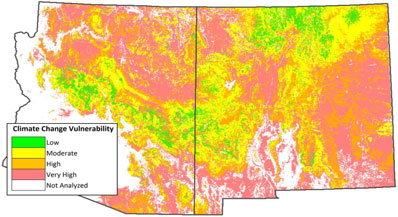
Climate change represents one of the most complex and unique challenges for natural resource management and poses an existential threat to sustaining the nation’s forests and grasslands. To protect and enhance ecosystems that provide life-sustaining services, management should be informed and guided by an understanding of climate change impacts.
The Ecological Restoration Institute is partnering with the US Forest Service Southwestern Region (R3) to help build a Regional Climate Adaptation Strategy. Our effort builds on the existing climate change science in the Southwest and will integrate with existing forest plans, the R3 analysis framework (landscape-scale projects), and other conventions of the Southwestern Region. The ERI and R3 are also incorporating a landscape context into our adaptation strategies, and are interested in working across boundaries to capture learning from adjacent land owners.

Project Objectives
- Share learning about climate vulnerability and adaptation strategies with land management practitioners.
- Dissemination of best available science on Southwest vulnerability assessments from Forest Service scientists, universities, non-government organizations
- Capture land managers’ knowledge and tactics from on-the-ground experience
- Develop a suite of localized, climate adaptation tactics for R3 practitioners
Webinars and Outcomes
- December 1, 2020. Understanding Climate Data & Resources for Climate Adaptation. This webinar highlighted information from Rocky Mountain Research Station, R3 planning, academia on available climate vulnerability assessments, and other available tools to refine our understanding of climate vulnerability.
- March 9, 2021. Climate Adaptation and Manager Needs Discussion Session. At this meeting, R3 ecologists introduced climate adaptation terminology. The majority of the webinar utilized breakouts to capture management needs to best incorporate climate adaptation strategies.
- March 22 and 23, 2022. Coronado National Forest Climate Adaptation Workshop. ERI convened Coronado National Forest, USFS Regional Staff, the Western Wildland Environmental Threat Assessment Center, and others to review the best available science on climate impacts in the Southwest, discuss manager priorities, and develop climate adaptation tactics.
i. Link to recording and summary forthcoming
R3 Vulnerability Assessment
Using Climate Projections to Assess Ecosystem Vulnerability at Scales Relevant to Managers (Treipke et al. 2019). https://esajournals.onlinelibrary.wiley.com/doi/full/10.1002/ecs2.2854
Fact Sheet: Climate Change Vulnerability Assessment of Upland Ecosystems: US Forest Service Southwestern Region (Wasserman et al. 2022) https://cdm17192.contentdm.oclc.org/digital/collection/p17192coll1/id/1122/rec/2
Socio-economic Vulnerability to Ecological Changes to National Forests and Grasslands in the Southwest. Supplement to the 2018 publication. (Borchers et al. 2021). https://www.climatehubs.usda.gov/sites/default/files/SocioeconomicVulnerabilitEcologicalChangesSW2021.pdf
Socio-economic Vulnerability to Ecological Changes to National Forests and Grasslands in the Southwest. Supplement to Forest Service GTR-383 (Hand et al. 2018): https://www.fs.usda.gov/treesearch/pubs/56851
Vulnerability Assessment for Piñon-Juniper in the Southwest (Also, native fish, riparian systems, sagebrush; Friggens et al. 2020): https://doi.org/10.1016/j.ecolind.2020.106830
A System for Assessing Vulnerability of Species (SAVS) to Climate Change (Bagne et al. 2019): https://www.fs.usda.gov/rmrs/publications/system-assessing-vulnerability-species-savs-climate-change
User Guide to the FireCLIME Vulnerability Assessment (VA) Tool (Friggens et al. 2019): https://www.fs.fed.us/rm/pubs_series/rmrs/gtr/rmrs_gtr395.pdf
Review & Recommendations for Climate Change Vulnerability Assessment Approaches (Megan Friggens et al. 2013): www.fs.fed.us/rm/pubs/rmrs_gtr309.pdf
Vulnerability of Aquatic Species and Their Habitats: Annotated bibliography (Friggens 2015):https://www.fs.usda.gov/rmrs/projects/vulnerability-aquaticspecies-and-their-habitats-annotated-bibliography
Aquatic-Riparian Climate Change Vulnerability Assessment https://www.fs.fed.us/r3/gis/gisdata/R3_ARCCVA%20Executive%20Report.pdf
Climate Score Card
The US National Forests’ and Grasslands’ work on climate change adaptation is guided by the Climate Change Scorecard. The new Scorecard provides a consistent and objective means to assess progress in the application of the adaptation framework and is focused on growth and shared learning rather than unit-level rating.
Climate Change Scorecard Factsheet: https://www.fs.usda.gov/sites/default/files/factsheet-scorecard.pdf
Additional Forest Service Resources
Climate Change Roadmap: https://www.fs.fed.us/climatechange/pdf/Roadmapfinal.pdf
Climate Change Adaptation Factsheet: https://www.fs.usda.gov/sites/default/files/ccadaptation.pdf
US Forest Service Research & Development: https://www.fs.fed.us/research/climate-change/
US Forest Service Office of Sustainability and Climate: https://www.fs.usda.gov/managing-land/sc
Additional Federal and Partner Resources
Climate Change Response Framework: https://forestadaptation.org/
Adaptation Partners: http://adaptationpartners.org/
Contacts:
Anita Rose, Regional Air Program Manager and Climate Change Coordinator
Jack Triepke, Regional Ecologist
Bryce Esch, Research Coordinator, Science Delivery, Ecological Restoration Institute